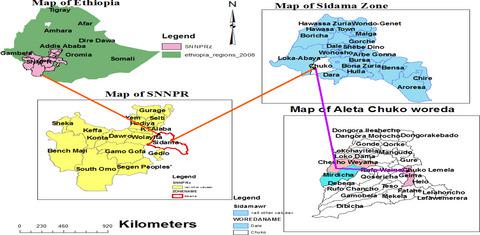当前位置:
X-MOL 学术
›
Food Energy Secur.
›
论文详情
Our official English website, www.x-mol.net, welcomes your
feedback! (Note: you will need to create a separate account there.)
Climate change impacts on household food security and adaptation strategies in southern Ethiopia
Food and Energy Security ( IF 4.0 ) Pub Date : 2020-12-04 , DOI: 10.1002/fes3.266 Adisu Mekonnen 1 , Ayele Tessema 2 , Zerhun Ganewo 2 , Ashenafi Haile 3
Food and Energy Security ( IF 4.0 ) Pub Date : 2020-12-04 , DOI: 10.1002/fes3.266 Adisu Mekonnen 1 , Ayele Tessema 2 , Zerhun Ganewo 2 , Ashenafi Haile 3
Affiliation

|
Climate change is predicted to adversely affect agricultural yields, particularly in African countries such as Ethiopia, where crop production relies heavily on environmental factors such as rainfall and temperature. However, there have only been a limited number of studies on the effects of climate change dynamics on food security in Africa, particularly at the household level. We therefore analyzed local climatic changes, the status of household food security, climate‐related causes of food insecurity, food security determinants, and the adaptation strategies of local farmers. Three decades meteorological data were analyzed. A total of 185 farmers were selected using simple random sampling and interviewed, together with focus groups. Data were analyzed using the descriptive and inferential statistics together with the logit regression model. Climate change over the last three decades was found to have a negative impact on the food security status of households. Crop production was constrained by poor rainfall, severe erosion, and increases in temperature. The unpredictability of rainfall, pests, and diseases were also contributing factors. Using the calorie intake approach, 60.5% of sampled respondents were found to be food insecure. Analysis using the logistic regression model showed that age and family size, as well as the amount of cultivated land and rainfall, were the significant (p < .05) factors influencing household food security status. A large proportion (69.8%) of farmers were incorporating adapting strategies into farm management including improved use of crop varieties and livestock production, in addition to income diversification. Taken together, these findings show that improving climate change awareness, facilitating the participation of female‐led households in income generation, and strengthening existing adaptation measures have positive impacts on food security.
中文翻译:

气候变化对埃塞俄比亚南部家庭粮食安全和适应战略的影响
预计气候变化将对农业产量产生不利影响,特别是在埃塞俄比亚等非洲国家,其作物生产在很大程度上取决于环境因素,例如降雨和温度。但是,关于气候变化动态对非洲,特别是在家庭一级的粮食安全的影响的研究很少。因此,我们分析了当地的气候变化,家庭粮食安全的状况,与气候有关的粮食不安全原因,粮食安全的决定因素以及当地农民的适应策略。分析了三十年的气象数据。通过简单的随机抽样选出了总共185位农民,并与焦点小组进行了访谈。使用描述性和推断性统计数据以及logit回归模型对数据进行分析。发现过去三十年的气候变化对家庭的粮食安全状况产生了负面影响。降雨不足,严重的侵蚀和温度升高限制了作物生产。降雨,病虫害的不可预测性也是造成这种情况的因素。使用卡路里摄入方法,发现60.5%的受访者食品不安全。使用Logistic回归模型进行的分析表明,年龄和家庭规模以及耕地数量和降雨量是重要的(使用卡路里摄入方法,发现60.5%的受访者食品不安全。使用Logistic回归模型进行的分析表明,年龄和家庭规模以及耕地数量和降雨量是重要的(使用卡路里摄入方法,发现60.5%的受访者食品不安全。使用Logistic回归模型进行的分析表明,年龄和家庭规模以及耕地数量和降雨量是重要的(p <.05)影响家庭粮食安全状况的因素。很大一部分(69.8%)的农民正在将适应策略纳入农场管理,除收入多样化外,还包括改善作物品种的使用和畜牧生产。综上所述,这些发现表明,提高对气候变化的认识,促进由女性主导的家庭参与创收活动以及加强现有的适应措施,都对粮食安全产生积极影响。
更新日期:2020-12-04
中文翻译:

气候变化对埃塞俄比亚南部家庭粮食安全和适应战略的影响
预计气候变化将对农业产量产生不利影响,特别是在埃塞俄比亚等非洲国家,其作物生产在很大程度上取决于环境因素,例如降雨和温度。但是,关于气候变化动态对非洲,特别是在家庭一级的粮食安全的影响的研究很少。因此,我们分析了当地的气候变化,家庭粮食安全的状况,与气候有关的粮食不安全原因,粮食安全的决定因素以及当地农民的适应策略。分析了三十年的气象数据。通过简单的随机抽样选出了总共185位农民,并与焦点小组进行了访谈。使用描述性和推断性统计数据以及logit回归模型对数据进行分析。发现过去三十年的气候变化对家庭的粮食安全状况产生了负面影响。降雨不足,严重的侵蚀和温度升高限制了作物生产。降雨,病虫害的不可预测性也是造成这种情况的因素。使用卡路里摄入方法,发现60.5%的受访者食品不安全。使用Logistic回归模型进行的分析表明,年龄和家庭规模以及耕地数量和降雨量是重要的(使用卡路里摄入方法,发现60.5%的受访者食品不安全。使用Logistic回归模型进行的分析表明,年龄和家庭规模以及耕地数量和降雨量是重要的(使用卡路里摄入方法,发现60.5%的受访者食品不安全。使用Logistic回归模型进行的分析表明,年龄和家庭规模以及耕地数量和降雨量是重要的(p <.05)影响家庭粮食安全状况的因素。很大一部分(69.8%)的农民正在将适应策略纳入农场管理,除收入多样化外,还包括改善作物品种的使用和畜牧生产。综上所述,这些发现表明,提高对气候变化的认识,促进由女性主导的家庭参与创收活动以及加强现有的适应措施,都对粮食安全产生积极影响。











































 京公网安备 11010802027423号
京公网安备 11010802027423号